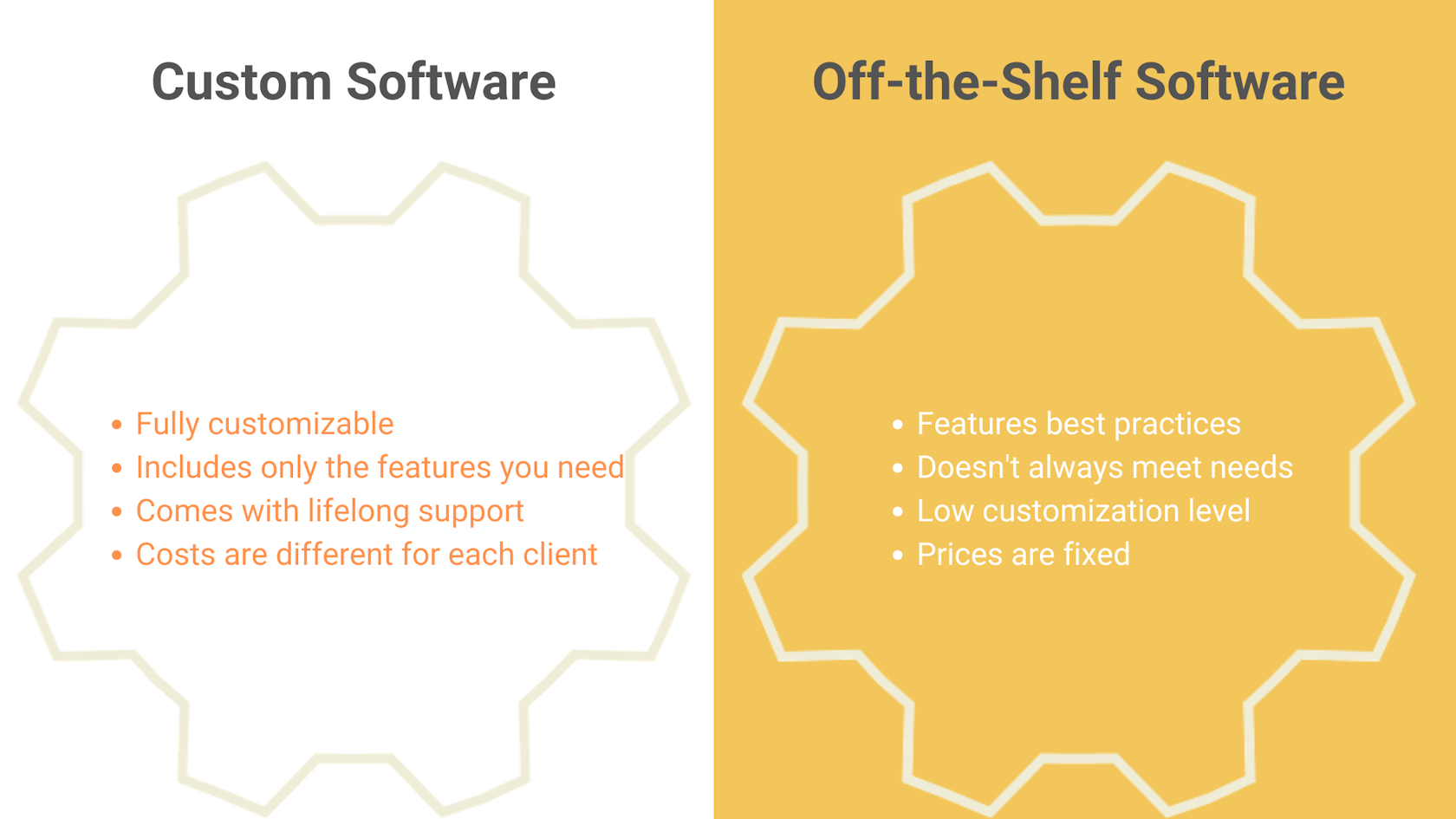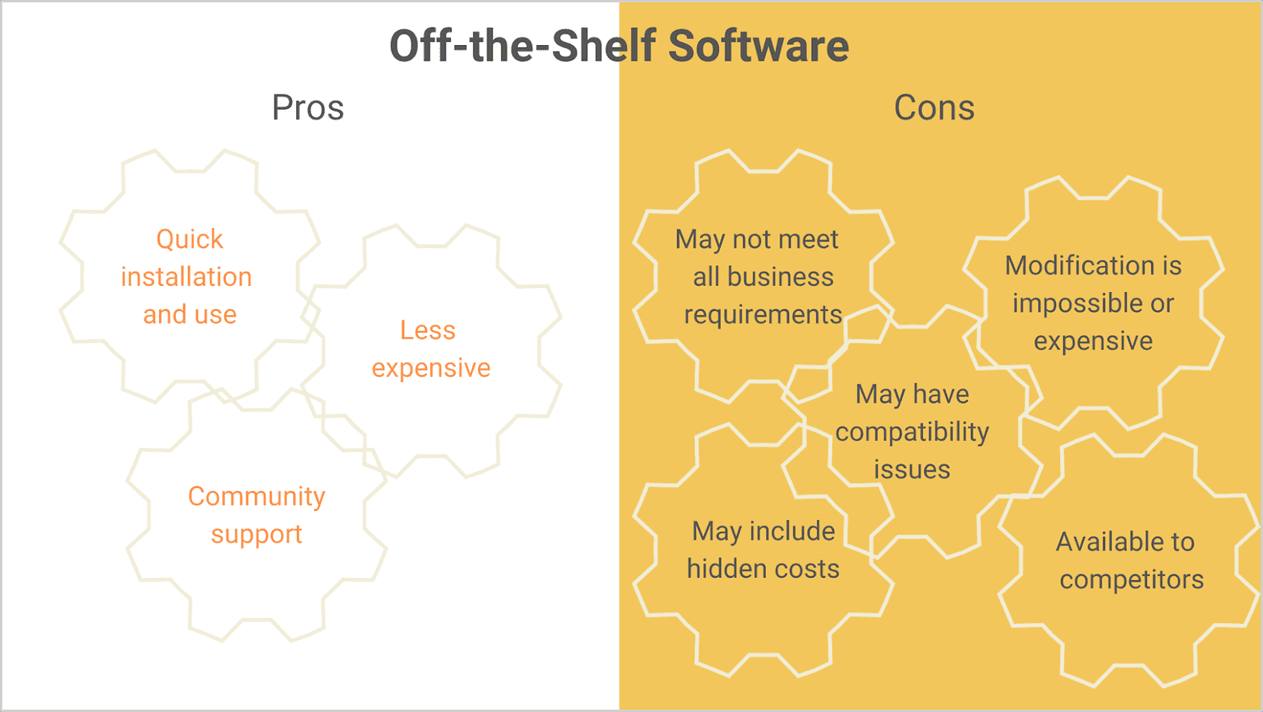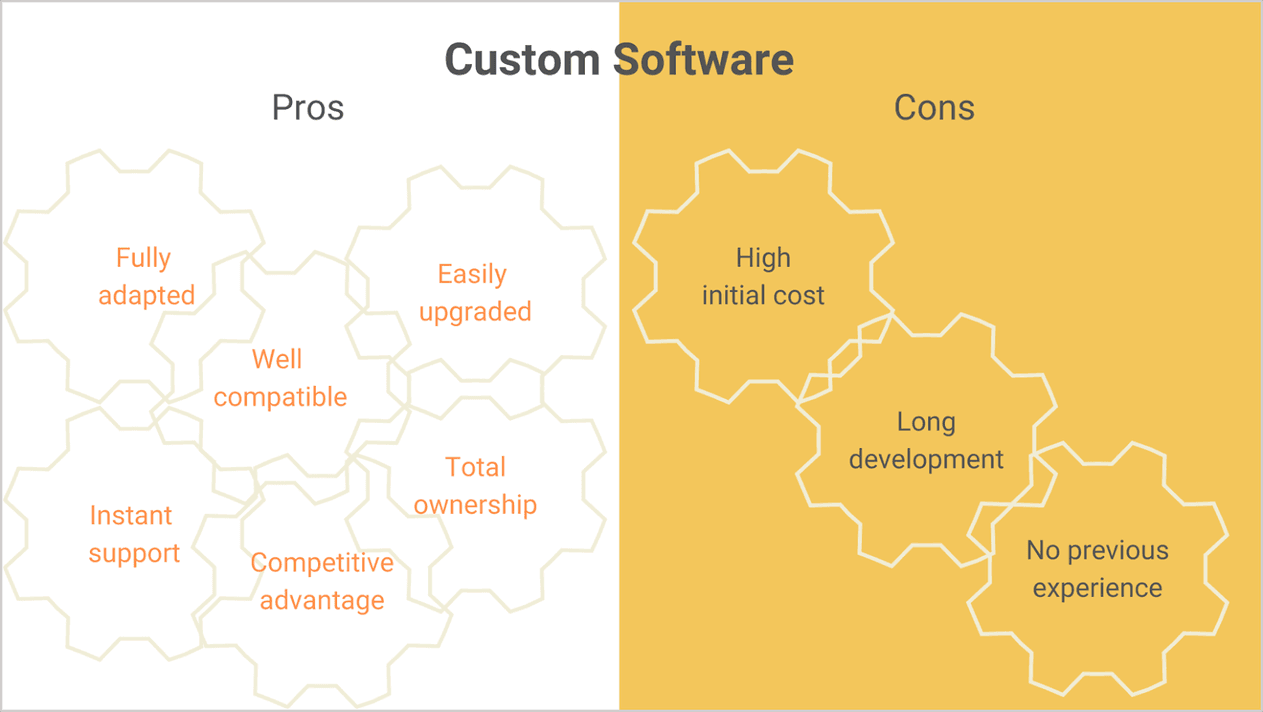
What is the Difference Between Off-the-Shelf Software vs Custom Software for Your Business
The software that powers your business processes is very important. It affects the company’s work, the level of customer service, and how solutions are delivered to the target market. So every entrepreneur faces a choice: buy vs. build software. And he or she understands that approaches differ in functionality, productivity, and usability. To find the answer, first try to understand what the business requires from software, web, or mobile applications, and then determine which is best suited: customized software or off-the-shelf solutions.
Our article will uncover the customizable software pros and cons, as well as ready-made software benefits and drawbacks to help you pick the right technology group.
WHAT IS THE DIFFERENCE BETWEEN CUSTOM AND OFF-THE-SHELF SOFTWARE
To understand how these two differ, let's first consider their essences.
Off-the-shelf software is a package solution you can use immediately. Such tools are created for a wide audience and for many business areas. They are based on best practices that have been proven effective by multiple users. However, off-the-shelf apps do not always fulfill all the demands of a specific task or area.
Well-known examples here are solutions from Google or Microsoft, or familiar-to-many CRM systems from Salesforce, HubSpot, Oracle, or Zoho.
Сonversely, сustom software demonstrates the most personalized approach, as tailor-made software can specifically consider business demands. To get it, the entrepreneur should assemble or hire a dedicated team that will develop an application for specific requirements.
Here is a small list of characteristics inherent in the two types.

Custom software vs off-the-shelf
ADVANTAGES OF OFF-THE-SHELF SOFTWARE
Both types have their benefits. Let's dive into the advantages of off-the-shelf software first.
Quick installation and using
If you expect a quick start, then such products are just for this. However, they are often difficult to integrate with existing systems, which negates the speed benefit.
Inexpensive
Ready-made apps are more affordable than custom software. The final tool development costs are spread across many end consumers.
Community support
Because it is widespread software, you can find out the experiences and reviews from other users before purchasing. In addition, guides are attached to these solutions, and therefore understanding the application intricacies will not be difficult.
Off-the-Shelf Software Cons
Now let's see what the downside is to the off-the-shelf software advantages.
May not meet all of the requirements
You may suddenly find that the app you have chosen is not suitable for the business, especially during a period of fast development. And while it may be cheaper than a custom solution, if it is half as functional or effective, you will soon lose all the money you initially saved.
Modification is impossible or expensive
You may need enhancements to your standard application when you decide to expand your business and add new activities. You may face the inability to do so, or the vendor requires a lot of money for it.
Compatibility problems may arise
It is highly possible that the business's operating systems or tools will interfere with the batch solution, making it unusable or completely ineffective.
May include hidden costs or unnecessary investments
Hidden costs can arise from paying for unnecessary additional features, fees for extensions and modules, and surcharges for licenses or additional users as your company grows.
Available to your competitors
It is always good when you have a unique factor that sets you apart from competitors. Packaged products do not provide this option.

Reasons to Choose Custom Software
Of course, each expert forms the pros and cons of the desired software, but there are a few general points that apply to most industries. Since we have already clarified the situation with off-the-shelf applications, let's take a look at the usefulness and advantages of custom-written software.
Fully meets your needs
Because it is built specifically for your unique specs, it provides an excellent solution to your problem when you are deciding which functions to integrate.
Easy to scale and upgrade
With custom applications, you can regularly request additional updates to maintain maximum functionality even with new requirements.
Works excellently with existing systems
Good custom products integrate into the working system without breaking core procedures.
Has great support
Custom vendors often provide lifelong support and service with a more bespoke approach.
Provides ownership
You do not have to pay the additional licensing fees typical of ready-made applications.
Presents a competitive advantage
It keeps you ahead of the competition since competitors will not have exactly the same functionality and productivity.
Custom Software Disadvantages
After such a list of merits, the choice seems obvious. But in fairness, let's look at other points that can be negative.
High initial costs
Building and deploying such applications requires more resources. But all the investments will pay off, given that they are perfect for you.
Takes time to create
Time is affected by the complexity and size of the application. Therefore, you may need from several weeks to many months.
No previous experience
When best practices are used in packaged software, custom alternatives are unique. You have to test them to see if they are useful, so you can consider ordering an MVP first. Read more about MVP development services for startups.

COMPARISON OF OFF-THE-SHELF VS. CUSTOM SOFTWARE
So we see that the main difference between custom-written software and off-the-shelf software is that the first type adapts to the business, and the second requires business adaptation. Let's sum up all the differences according to certain points.
Ready-made vs custom-made software
| Off-the-Shelf Software | Custom Software | |
| Functionality | Functionality is hardly adapted to unique needs. | Has a wide range of functions, since it can be adapted to almost any activity. |
| Implementation | You have to deploy software that does not exactly get into your processes and can break important data or result in more costs. | You can easily install apps without harm to processes or data loss. Modify any feature to match the growth and conquest of new markets. |
| Support and Maintenance | Usually, support centers work fine. But all subsequent updates are provided at an additional payment. | Lifetime support and product updates are included. |
| Security | Security is on the provider, so make sure they hold required documents. | You have control and responsibility for security. Also, custom software is usually less frequently targeted by hackers. |
| Time | App deployment and mastering takes several days, so you get a working solution very quickly. | In order to start working with the final product it will take at least several months. |
| Money | The initial costs are low. But the total cost can be much higher due to monthly subscriptions and hidden expenses. | The total cost of ownership can be quite affordable due to the relatively high start-up costs and low operating expenses. |
Tips for Choosing a Perfect Software Solution for Your Business
To pick between off-the-shelf software vs custom software, you also need to consider a few aspects.
State your needs
Your objective should be completely clear to you. Determining your needs and purpose will save time and money. Start by identifying your current problems: using too many business tools, endless spreadsheets, fragmented sources of information, and so on.
Map your workflow
Think about your daily routine and make a list of all activities and information used. Then, link your company's issues to your workflow to see which aspects need to be corrected or alleviated with a new software tool.
Be attentive to further requirements
After analyzing the problems and workflow, think about additional requirements from customization to design and UI.
Link your objective and requirements to your budget
Set a budget that you are willing to spend. Consider how much your company will benefit from solving problems at the expense of these costs. Then find a ready-made solution or team to develop a custom product that suits both your goals and budget.
Read Also: How To Develop Accounting Software?
Our Experience
Gearheart has extensive experience in custom web application development for various businesses. Let’s take a look at some of the solutions developed and successfully implemented by our specialists.
Olivia. Olivia is an internal project management system developed for the US boutique broker dealer firm. It provides brokers with a platform to perform financial operations in the expanding market of private securities where investors and entrepreneurs find each other to reach investment deals.
ShootQ. ShootQ is a photography management CRM software. The application is designed to solve real-life problems and allows for accounting clients, scheduling photo shoots, tracking tasks, advertising studio services, and creating email marketing templates.
Transpose. Transpose is a project management software that allows customers without any special training to build databases, add records, manipulate data, visualize, and analyze their business progress.
You can read more about working on these and other projects, such as medical billing software development or virtual classroom app development, in our blog.
Conclusion
In the end, whether you choose custom or off-the-shelf software, remember that you should try to best meet your business needs. For simple common questions, start with ready-made software and customize it as needed. But if you want to work much more efficiently and stay ahead of the competition, consider creating a custom tool.





